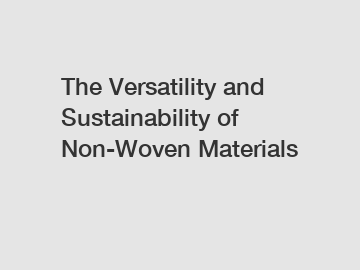The Versatility and Sustainability of Non-Woven Materials
In the world of textiles, there exists a fascinating class of materials called non-wovens. With their remarkable versatility and sustainability, non-woven materials have gained prominence across diverse industries. This blog aims to shed light on the diverse applications, benefits, and eco-friendly attributes that make non-woven fabrics an essential component in today's society.
Unveiling the Secrets of Non-Woven Materials:
Non-woven materials are engineered fabrics created by bonding or entangling fibers through mechanical, chemical, or thermal processes—no weaving or knitting is involved. This unique manufacturing process empowers non-wovens with a range of remarkable properties that set them apart from traditional textiles, making them suitable for a vast range of applications.

The Versatility of Non-Woven Materials:
1. Medical and Hygiene Products:
The medical industry utilizes non-woven materials extensively. They are an integral part of surgical gowns, face masks, wound dressings, and wipes due to their exceptional barrier properties, absorbency, and softness. Furthermore, non-woven materials assist in preventing the transmission of infectious diseases and maintaining a hygienic environment.
2. Filtration:
Non-woven fabrics act as efficient filters, making them widely used in air and liquid filtration systems. Their ability to capture particles, coupled with excellent air permeability, helps maintain cleaner air and water quality. From household air purifiers to industrial filtration systems, non-wovens play a vital role in safeguarding our environment.
3. Automotive Industry:
Non-woven materials have revolutionized the automotive industry, providing lightweight yet durable solutions. From interior upholstery and headliners to noise insulation and under-hood components, non-wovens enhance comfort, reduce noise, and improve fuel efficiency.
4. Agriculture and Horticulture:
In agriculture, non-woven materials are extensively used as crop covers, protecting plants from adverse weather conditions, pests, and weeds. Additionally, non-wovens find application in horticulture as plant pots, weed barriers, and erosion control fabrics, ensuring optimal plant growth and long-term soil sustainability.
Sustainability of Non-Woven Materials:
1. Reduced Waste:
By eliminating the need for weaving and knitting, the production of non-woven fabrics generates minimal waste. Moreover, advancements in recycling techniques enable the creation of non-wovens from recycled materials, making them an eco-friendly choice.
2. Energy Efficiency:
The manufacturing process of non-woven materials requires less energy compared to traditional textiles. This reduced energy consumption contributes to a lower carbon footprint, making non-wovens an environmentally responsible option.
3. Biodegradability:
Certain non-woven materials are designed to be biodegradable, ensuring that they break down naturally and return to the environment without causing harm. This characteristic makes them highly desirable for numerous single-use applications, further enhancing their sustainability factor.
Conclusion:
The remarkable versatility and sustainability of non-woven materials have propelled them into the limelight as a preferred choice across a myriad of industries. From medical and hygienic products to automotive components and agriculture applications, non-wovens amaze us with their diverse capabilities. Embracing these innovative fabrics ensures reduced waste, energy efficiency, and a positive impact on our environment.
So, whether you're donning a surgical mask, improving air quality with filtration systems, or enhancing your gardening techniques, non-woven materials silently play a vital role in making our lives safer, more comfortable, and environmentally conscious.
Contact us to discuss your requirements of disposable delivery pack, disposable laparotomy pack supplier, disposable surgical universal pack. Our experienced sales team can help you identify the options that best suit your needs.


